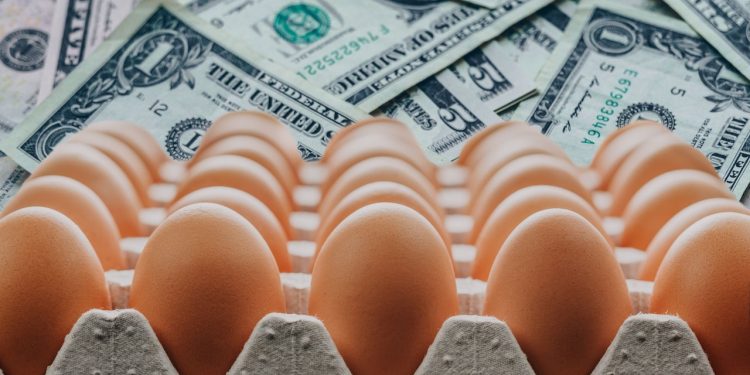This pork roll, egg and cheese sandwich is starting to look like a splurge meal as egg prices in New Jersey have risen.
Nationally, egg prices have increased more than 36% since last year, according to new Consumer Price Index data from the Bureau of Labor Statistics.
The average cost of a dozen eggs is $4.15, but some regions are buckling under price pressure more than others. Experts say the growing bird flu crisis is driving up costs.
In the New York metropolitan area, eggs cost an average of $6.72 per dozen, an increase of 47 cents from the previous week, according to a weekly egg report from the U.S. Department of Agriculture.
That’s still cheaper than California, where eggs cost $8.97 a dozen. New Jersey specific numbers are not available from the USDA.
An informal survey of grocery stores across the state conducted Wednesday morning by NJ Advance Media found that prices varied by store, but were fairly similar within the same chain stores. On average, a dozen eggs costs about $5.10.
To keep things consistent, we looked at commercial brand large eggs, grown conventionally. In some stores, free-range or branded eggs were a few dollars cheaper.
Prices ranged from $6.99 at nine different Stop & Shops to $7.48 at a ShopRite in North Jersey.
Aldi had the cheapest price per dozen, at $3.85, but some Aldi stores were charging $4.99, the same price you’d find at Wegmans across the state.
At Costco, two dozen eggs cost $8.06. Two dozen is the smallest package sold by the warehouse. Sam’s Club sells a carton of 18 eggs for $5.92.
Growing concerns over bird flu mean prices may not have peaked yet.
Five outbreaks in five different states resulted in the loss of 5.6 million chickens in the final weeks of 2024 and early 2025.
Since October 2024, more than 17 million laying hens have been lost, according to Expana, a price data company.
Demand for eggs typically declines in January, as the holiday baking season ends. But demand has remained high this year, despite high prices.
In Georgia, two cases of bird flu have been detected in commercial poultry farms. It’s unclear how this might affect the price of chicken meat, if at all.
Several cases of avian flu are suspected among New Jersey’s wild birds, but no cases have been reported in domestic poultry or livestock in 2024 or the first month of 2025, state officials said.
“We continue to continually test backyard flocks and live bird markets, as well as monitor what is happening nationally regarding this virus,” said Ed Wengryn, Secretary of State for Birds. ‘Agriculture. “Protecting our nation’s poultry and livestock industry starts at home. »
Although it hurts Americans’ wallets, bird flu poses a relatively low risk to the average person’s health.
No new cases of flu were reported among New Jersey residents Friday, the state Department of Health said in a statement.
“While we have not seen any human-to-human spread of H5N1, there have been cases of human illness nationwide from the virus ranging from mild to severe symptoms,” said New Jersey Health Commissioner, Kaitlan Baston, in a press release.
“The good news is that the current public health risk remains low,” Baston said. “However, it is important to understand your risks and take necessary precautions to mitigate them.”
Please count on us to provide you with the journalism you can trust. Please consider supporting NJ.com with a subscription.
Katie Kausch can be contacted at kkausch@njadvancemedia.com. Follow her on Twitter @Katie Kausch.

